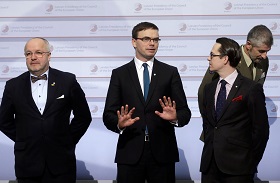Finland’s political landscape has not yet produced a dominant party able to form a government of its own with solid parliamentary support. Consequently, the coming arrangement will again be a coalition, although its composition may change.
Finland’s political landscape has not yet produced a dominant party able to form a government of its own with solid parliamentary support. Consequently, the coming arrangement will again be a coalition, although its composition may change.
Question number one for Moscow is definitely Helsinki's foreign and defense policy, as well as the attitude to NATO membership. However, these issues are not likely to conquer the electorate.
As in other North European countries, Finland belongs to the community of advanced nations, the so-called golden billion. Hence, its main interests lie in the same track with NATO and nonaligned like-minded states on other continents. All Finland wants is to preserve the status quo in terms of the division of labor between the global vanguard and global periphery and to promote the globalization of the neoliberal market model and Western values in order to solidify the West’s economic and political leadership. And the approaching elections are unlikely to rock this basic concern of the Finnish elite.
This commonality with Western partners should be used as a key factor in assessing the prospects for Helsinki’s future foreign and defense policies. This is why the Finnish adepts of NATO membership are not shaken either by U.S. leadership in the Western world, by Washington’s attempts to erect and legalize a unipolar global structure or by its questioning the UN Security Council prerogative in maintaining international peace and security with the aim being to shift this mission to NATO.
Finland’s establishment regards NATO membership as a sort of guarantee for the protection of its basic interests. Hence, many within the elite, primarily in the National Coalition Party and the Swedish People’s Party of Finland, support joining the bloc. According to surveys, NATO membership is opposed by the Center Party (the likely election winner), the Social Democratic Party, the Finns Party, the Christian Democratic Party, the Green League and the Left Alliance.
Since an application to NATO requires a two thirds majority in parliament, such a majority seems unlikely. Opinion polls show that if a national referendum on NATO membership is to be held, the outcome would be unlikely to be in its favor.
Finland remains active in integration processes with other countries in Northern Europe to expand areas of common interests and strengthen foreign policy cooperation. In 1991, Finland and Russia vowed to refrain from allowing its territory to be used for military aggression against each other and from rendering military assistance to a potential aggressor. So, Finland’s membership in NATO seems to run counter to these clear commitments.
In 2010, Finland entered into the Nordic Defense Cooperation arrangement, which has significantly expanded the scope of Nothern European countries’ foreign policy cooperation on a premise of unconditional observance of independence and sovereignty of the northern states. Pundits doubt that in today’s environment Finland will forgo these values for the sake of NATO accession, although this does not mean that Helsinki will refrain from bolstering and expanding its already strong ties with the alliance.
In 1994, Finland joined NATO’s Partnership for Peace program and April 2014 signed a memorandum of understanding with the bloc. Those who back Finland’s NATO accession are doing their best to exploit the Ukraine crisis and the aggressive Russia slogans put about by Western politicians and the media in order to present the accession as Helsinki’s life saver.
However, the 65-year-long mutually beneficial and equitable cooperation after World War II, and the resulting pattern of trustworthy neighborly relations deliver joint political capital that greatly benefits both sides. And the Finnish parliament’s recent decision to establish a time-limited visa-free regime for Russians visiting Finland seems to indicate that the Finns are hardly willing to have this asset wasted.
It seems unfeasible to calculate the benefits of joining NATO for Finland’s domestic and foreign politics, but the same cannot be said of the inevitable losses the country’s cooperation and the entire dialogue with Russia will suffer if it becomes the alliance’s springboard in close proximity to Russian critical infrastructure along their common border.





